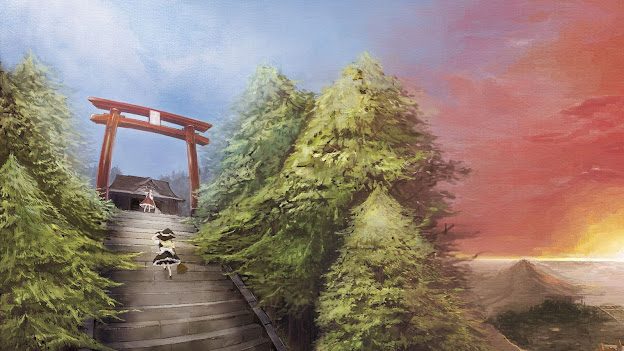Touhou as modern Folklore
Modern incarnations of folklore are usually really lame. "Urban legends" are an exemplar set of these which I truly despise. They are usually exceptionally dull and mundane, and they have to be in this era in order to keep the possibility alive that they may be true. Mythic Americana is somewhat more appealing, but the common inclusion of technological and political elements grounds these stories as something of the past, rather than a timeless tales of the old world set both in the furthest past and in the very present.
It is said that the art of oral tradition as the driving force behind the proliferation of European fiction died out in the 1700s due to the mass-production of printed material and cataloguing of lay texts, and that we then entered the era of literature. Within a literative framework stories stay stagnant and unchanging. Dickens' Christmas Carol will forever be the same, his words static. While it isn't true that oral storytelling dies out, it definitely took a back seat. Wives tales and ghost stories still spread out under their own memetic power from person-to-person even today, just as legends always have.
The internet has brought us a new paradigm of storytelling however. While printed material can only be produced with time and cost, and the privilege to publish is thus kept to the literary and academic few, writing for the internet requires next to no resources and thus acts more similar to an oral communication. While text on the internet may last forever in some areas, in many others it disappears under an infinite pile of other data never to be looked at again within hours of its publishing. This extreme speed of text publication and distribution means that only the best things stay around, as dictated by popular rule. If a post is particularly noteworthy, others will save it and then post it later, meaning the best works can be spread incredibly fast and have long staying power. Nowhere is this more pronounced than the bulletin-board forums. These, such as 4chan or her Japanese equivalents, have data turnover of just a few hours, and once a post is gone it is gone for good unless others saved its contents. This creates a framework for incredibly fast oral storytelling, thus leading to folklore built in the same vein as that from many generations ago.
Internet folklore as progenated by bulletin boards has spread across the whole of cyberculture, from simple memes and copypastas to complex mythoses and narratives. The case I have the most insight into is that of the Touhou set of tales. For the whole of the 00s pushing into the 10s, Touhou was the central pivot point around which the cyberotaku culture worked. Everybody understood the characters and what they symbolised, even if they had no real connection to the franchise as a commercial organisation. The original games are simple and light on explanations, leading the fanbase that grew around it to build most of the now immense lore by themselves. If an idea caught on, it became the new canon. From this chaotic miasma clear meanings arose, and specific traits and symbols were attached to each character and their interactions. These naturally built traits then went on in turn to inform the games themselves, giving the subculture a truly folklore-style feeling. Each game outlined a new basic plot and new character designs, which were heavily extrapolated on by fans in both the West and Japan, until they formed a coherent story which had immense meaning to the members of that community since those ideas that were most pertinent to their identity bubbled up to the top, building what I would describe as the most otaku work ever. Soon, as folklore does, Touhou became more than just a set of stories, it became something so close to the meaning behind people's lives that it started to be a lens through which to see the world. The Touhous were gods, living above but parallel to the real world and acting as a heavenly, unreachable paradise.
The relevance of Touhou has slowly reclined over the last decade, and the lore is mostly now unchanging. The core facets of the world and its characters are still important to the 2ch/4ch culture and widely understood, but there will be a time when the relevance of these stories is nothing and they disappear along with their power. I want to record some of the more specific understandings I have of the Touhou cult in further writings, they are stories that are very close to my heart and are closer to me than any other modern mythology. I also want to record it for the sake of posterity. There are highly detailed wikis on the lore, but I want to record them as I understand them and how I think they reflect our shared subculture.

